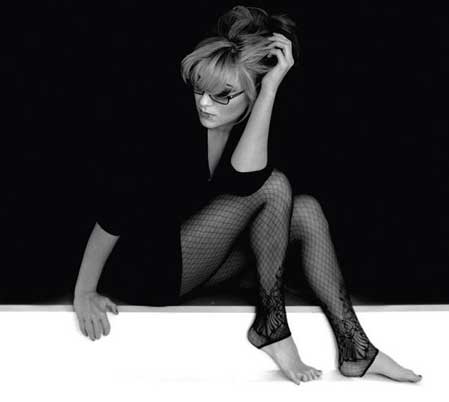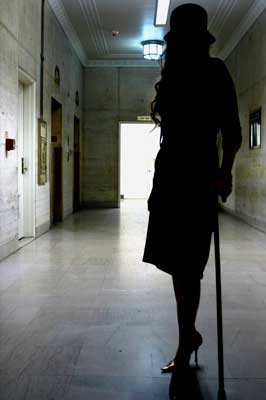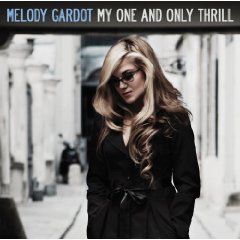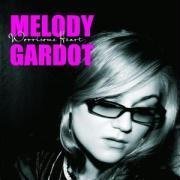Melody Gardot:‘Music is the thing that saved me. It's the thing that gave me purpose. In my mind it made me walk. It gave me the dignity of being a human being who could do something, and we all need purpose. If nothing defines your character, nothing gives you the ability to wake up in the morning. I think we can easily lose the passion to exist, and then it becomes hard to wake up, hard to go to sleep. So in that sense, music has become my priority.’‘Music is my love, men are just my lovers’
Melody Gardot’s body is ravaged by injuries she suffered in a near-fatal road accident that left her bedridden for a year. Playing music gave her the will to walk and talk again, and she is now a rising star. But can anything heal the scars of her childhood?
By Chrissy Iley
For the The Sunday Times of London, March 29, 2009
(http://entertainment.timesonline.co.uk/tol/arts_and_entertainment/music/article5980706.ece)Melody Gardot's soul-drenched voice sings torch songs about love and disappointment, of pain being part of life. Gardot has learnt not only to live with pain but to use it to give her a new life as a musician.
We meet in her overheated hotel suite in Los Angeles. A raucous dinner was planned, but Gardot is feeling fragile. She still walks with a stick and wears tinted glasses at all times because she can't look at light. She likes to drink cognac and smoke cigars and talk about sex, but the accident she was in five years ago still takes its toll on her, emotionally and physically.
When she was 19 she was cycling with purpose—she thinks maybe to go to the bank. The exact errand, along with a lot of what happened in her life, has been wiped from her brain. A Cherokee Jeep went through a red light and knocked her to the ground. She remembers struggling and she remembers not being able to move, and that if pain was given marks out of 10, this pain would be 40. Then she remembers the hospital. They were trying to cut her clothes off. She remembers screaming "No!" as they got to her newly purchased Agent Provocateur bra.
The accident was so severe, with serious injuries to her head, back and pelvis, that she was bedridden for a year. Her muscles atrophied and she had to be taught how to walk again. She couldn't remember anything, like how to brush her teeth. Words, in which she had been very fluent, a straight-A student, crumbled away.
She was bedridden for a year. Her muscles atrophied and she had to be taught how to walk again. She couldn't remember anything, like how to brush her teeth. Words, in which she had been very fluent, a straight-A student, crumbled away.Before the accident, she'd played the piano, and it was suggested that music therapy, which has been proven to help redefine neural pathways, would benefit her. She was bought a guitar, which she learnt to play while supine. At this point she could barely stand. But the music brought her back to herself. "Music is the thing that saved me. It's the thing that gave me purpose. In my mind it made me walk. It gave me the dignity of being a human being who could do something, and we all need purpose. If nothing defines your character, nothing gives you the ability to wake up in the morning. I think we can easily lose the passion to exist, and then it becomes hard to wake up, hard to go to sleep. So in that sense, music has become my priority. Music is my love. Probably the greatest love of all for me. Men are just my lovers."
A friend who was impressed by her songwriting—always simple, pure, clear, from deep inside her—created a MySpace page for her. Then came a request to play a gig at a well-known cool venue in Philadelphia, where she was living. Then WXPN, the radio station that helped to launch Norah Jones's career, called asking for a demo, which she didn't have but quickly got together. And that resulted in a deal with the world's biggest record company, Universal. An insider, who asked not to be named, says her album My One and Only Thrill, is this year's top priority, with U2's new album.
Melody Gardot, ‘Baby I’m a Fool’She's wearing leggings that are a little too baggy for her skinny limbs. Her foot is scarred from swimming into coral. She catches me looking at them. "I can't walk too well, but I can swim like you wouldn't believe." Resolutely, her glass is always half-full and brimming with vintage champagne. "The accident made me a writer, musically. In fact, it was a catalyst in so many ways that I didn't expect. In the beginning I wrote like someone who was trying to make a record. It's like an artist's sketchbook. And then music became something else for me, a bodily function, like a fart. You just have to let it out.
"I wrote before I could walk. At around nine months I first made an attempt to walk, but when I wasn't in therapy I was in bed. About 13 months post-accident I was walking with a cane, but like Frankenstein." (She means Frankenstein's monster.) "It took four different intensive therapies to walk with fluidity in my gait, and even now if I get cold, it hurts and makes my muscles tight, so I had this little wobble thing.
"I learned to play the guitar on my back, so it's strange to relearn it, as I am now able to sit. I get really bad vertigo when I stand up, so I don't want to run the risk of being known as a collapsing musician." Did she ever get vertigo before? "No, it was all part of the damage to my nervous system. The top and bottom of my spine was damaged as well as my pelvis. This also means that your sensitivity to light and sound is affected, so I've had lots of therapy: vision therapy, music therapy, walking therapy."
It is the music therapy that not only saved her life but gave her a whole new one. "When I was 16, I played in a piano bar [it started when she ran out of petrol and needed to make her gas money home]. I'd play the Mamas and the Papas and Radiohead. But writing my own songs couldn't have been further from my mind."
Even though she walks with a cane, she always wears very high heels. She likes to be extreme: "I have high arches. I don't even own sneakers."
Melody Gardot, ‘Who Will Comfort Me,’ Late Show with David Letterman, June 2009In a rather Buddhist-like way, she has no home and few possessions. She travels with just two suitcases: one small, one big. She found that she was permanently on tour, so she got rid of her flat in Philadelphia, and gave her furniture and cat away to friends. She says she doesn't miss the flat. She shows me a picture of it on her MacBook. It was sparse: a piano, big windows, blond-wood floors. She misses her cat, though.
"I used to use Maestro as a gauge for songs when I was writing," she says. "If he didn't like it, he'd go and sit on the other side of the room." She shows me pictures of Maestro, a tuxedo cat. "He is handsome. I have two rules if you want to live with me: you need to be handsome and well behaved. He made the grade."
She says she has a relationship, but she's loath to use the word "boyfriend.” "There is somebody I would say I favor very deeply."
Just what you would expect from someone who doesn't think it's right even to own books.
"I think books are for libraries. I read them four or five times and I give them to friends, because they are in my brain. But I do have three books that travel in my suitcase: a Voltaire, and Zen Mind, which is a Buddhist book, and a book of homeopathic recipes." Her memories are like her possessions. A few are treasured, but many seem to have gone, been given away or lost. It's unclear whether that is to do with the accident or a disposition that refuses to hang onto anything.
On the album, she sings “Over the Rainbow.” She grew up being looked after by her grandmother, who constantly played her The Wizard of Oz. She also had The Sound of Music, but her grandmother forbade her to watch it. "She loved that movie because she came from Vienna. It is rumored that my great-grandfather was a conductor in Poland." Why rumored? Was he lost in the Holocaust? "Not that I know of. It's just that that generation kept things secret; they would never talk about anything." She too won't be drawn.
"I think she just wanted to keep The Sound of Music very pure. She died very young, as did my grandfather: they didn't survive past their late fifties. My mum was working heavily until I was seven or eight. You know what single moms are like—working, working, three jobs. So I was raised mostly by my grandmother."
Listening to her songs, you feel the torture and chaos that have been buried in calm smoothness. At her most fragile, she is at her strongest. (Photo: Albert Yee / www.albertyee.com)Her mother still lives in New Jersey, where she grew up. She is now a photographer. And what about your father, did you know him? "No, not at all." The calm slips away momentarily. The only noise is the whir of the air conditioning. "I'd prefer not to go into it." I've been told that she doesn't even know who her father is, but she doesn't confirm that. Instead she says: "My mom married and I had a stepfather for a little while." He too seems to have evaporated.
"I prefer cats. They are independent. Mine would jump up and kiss me on the nose, and he would sleep with me or he wouldn't. It was his choice." Do you prefer your men the same way? "Yes, a lack of need is really attractive to me.
“I don't like needy. I don't like to be needy, though I like to be taken care of. That's important to me."
So her boyfriend couldn't be too needy? "I have to say it's very difficult to do anything while I'm constantly touring, and I think monogamy is boring in a lot of ways. I think when you love somebody you love them openly. You cherish them for the time you are together. I don't believe in one person for everything. I think you meet people for different reasons, whether you fall in love for a moment or you just love them. You pass through, learn from each other. You comfort each other at that time... Unless they are jerks.
"I'm a very independent person, and I don't believe there's much to be gained from putting my stability in another person's hands. Maybe it's because I was raised by a single mom and most of my experience has been around women who are strongly independent. You bring what you bring to the table, and if they have things to offer they offer them, but you don't need them."
Perhaps it has come from a place further away than that. Her upbringing seems very peripatetic, and she was unable to form attachments for long. "We lived like gypsies. I cannot tell you how many times my mom would come home and say, 'Put everything you want into a bag—we're going.' " Was that because she couldn't pay the rent? "Maybe." She gives me a gurgling laugh.
"It was called Black Bag Day. At one point, I remember, I had a lot of stuffed animals because we'd been in this place for about a year and a half—long for us. I decided to take all the animals, no clothing. But she peered into the bag and said, 'You can't take all your animals—only three. You need to put in clothing.' I don't have any of them now. It brings back painful memories. That idea of suitcase space. Everything is primary."
Melody Gardot, Harburg-Arlen’s ‘Somewhere Over the Rainbow,’ May 19, 2009As often happens with only children of single parents, she grew up fast. She seems too wise for her 25 years. Was she in a way the nurturer to her mother? "In some ways, yes," she says. Her voice carries sadness, yet she is not sad. It's the same voice that's on her album: nurturing yet distant. The pain once severely felt is now remote.
"I've never really thought about that making me grow up faster. I've always just checked myself off as an old soul. But yes, I was cooking her dinner for when she would come home when I was at least seven. I remember her teaching me how to cook eggs because she couldn't be there. I remember doing my own laundry as a kid.
"It's rare that I meet people who are my age that I relate to. I love the world of the elderly, because of how much they've seen, but I also adore really young people. It's the middle section that I get bored with."
Her mother was on holiday in China when Melody had her accident. Her messages didn't arrive until four days after she was hit. "By the time she got the message, she was completely freaked out, and I was so stressed out and crying and in a mess, in and out of consciousness.
I couldn't see, because I had a bad disruption of my vision. But I heard her voice, and my whole body relaxed. That's when I realized how comforting a woman's voice can be," she says, in a very nurturing way. Interestingly, she doesn't say "my mother's voice.” She says they are close, although she is not often photographed by her any more because it's uncomfortable. Mother would always want less cleavage than daughter.
Until recently, Gardot had to travel with a physical therapist, and she often has a Tens machine strapped around her waist, which delivers impulses to the body to reduce pain. She knows yoga therapists and Pilates practitioners and craniosacral masseurs in every part of the world. She loves to cook, always requesting a hotel room with a kitchen, and she tries to eat macrobiotic food and to be aligned with the seasons: pineapples and coconuts in the summer, miso soups and oily fish in the winter.
"If I branch out from that diet, there are consequences physically. I can, but only in moderation. I really love cognac. That is my big vice. I don't drink it daily, or even weekly, but I do it often when I'm performing because it's really soothing." She says she generally fasts on planes, and today she is feeling a little queasy because yesterday she ate on one. Her skin looks chalk-pale, and you are in awe of how so much strength can come from so much fragility. She says she's too nauseous to come out to dinner and, besides, she has to get up for a video shoot at 4 a.m.
The next day, Gardot disappears, and then we learn that she is in the hospital. On the way to said video shoot, her car crashed into another. Shaken by the fact that history had repeated itself, she cancelled her visit to Japan and stayed in the hospital in Los Angeles for a few days. It does seem disturbing that lightning would strike twice, even though it wasn't in so severe a way.
Is there something about her karma that means she is an accident waiting to happen?
Listening to her songs, you feel the torture and chaos that have been buried in calm smoothness. At her most fragile, she is at her strongest.
Buy My One and Only Thrill at www.amazon.com
Writing in The Guardian, March 13, 2009, John Fordham, noting the near-tragic circumstances preceding Ms. Gardot’s ascension to stardom, noted: “…she sounds as if she has learned her art in privacy and some distress, only releasing a note once it’s burnished to a perfect pale sheen. Her evocative vibrato suggests an introverted Edith Piaf, and she specializes in rather self-denying love songs. The followup to her successful Worrisome Heart is mostly wistful, sometimes strings-accompanied originals—though ‘Somewhere Over the Rainbow’ gets some twists to the tune and a Latin groove. There are several short horn solos (most effectively from cool-school alto-saxist Gary Foster), while the earthier tracks have an arresting, Cassandra Wilson-like bluesy snap or a raucous, New Orleans clamor (“Your Heart Is Black As Night”), and the title track is a compelling vehicle for Gardot’s tendency to sing as if she is anxious not to disturb the air. Some might find the I’ll-do-anything-for-you agenda and rolling of her Rs in her occasional modest scats a little annoying, but at her best she’s poignant and honest, and has a voice and a story of her own.”
‘I'm never really afraid of bad news at this point in my life’
Melody Gardot on Worrisome Heart
By Pete LewisWhat was the thinking behind your debut LP, Worrisome Heart?
Melody Gardot: It was created independently of a record company. It was made privately. So my only intention, or my only goal, was to make a record that at the end of the day I was happy with. And the way that the instrumentation was decided on was based on what I heard in my head, and what I thought would feel the best. So I guess having it released is kinda like having somebody publish your diary in a way! And the fact that people are enjoying it is kind of a supplementary beautiful thing. You know, to have album an embraced the way it is, is something really special and not something I take too lightly.
Your lyrics have been described as "communicating a wise, determined and occasionally-lighthearted take on life.” What inspires them?
Gardot: My songs are based on life. You know, I think good writers write about what they know. So, without going into specifics, they all reflect things I've encountered in various ways. And I named the album after the song “Worrisome Heart,” because I thought that was the track that best summed up the state I was in while finishing the record. You know, really a record for any artist is just a mark of where they are at that time. And that was the one that made the most sense in describing where I was.
Melody Gardot, ‘Worrisome Heart,’ title track from her major label debut, performed live in ParisHow did your near-fatal accident initially kick-start your current musical career?
Gardot: After the accident I was in physical rehab for a year. I'd seen 11 doctors, I was taking all this medication, and it was making me sick. So I went to see one particular doctor—Dr. Jermyn—and he was like “You have to find something that makes you happy. What did you do before the accident?” And, when my mom said, “She used to play piano in piano bars,” his eyes lit up! The whole temperature of the room changed! He was like “You love to do music, and it's the only thing that helps to reconnect the neural pathways in your brain.” And I guess, looking back now, my experience can be seen as proof of not-so-good things coming along and leading to better things. Which is why I'm never really afraid of bad news at this point in my life!
How did all that eventually lead to your current record deal?
Gardot: Well, as I aid, I started doing music for reasons of therapy. I only made that first EP because I needed to remember what I'd done. And recording and listening back to the music was a tool to help me do that. So the only thing I can say is that the rest was really out of my hands, in that I didn't force it in any way. The Philadelphia DJ Helen Leicht heard my music. So she started playing on the radio a CD that had been burned off my computer—though frankly the quality of the music was not that good! I mean, it had been recorded on a little tape-machine in my bedroom while I was in bed! You could practically hear my cat in the background, as well as the water-tank! So, for people to started requesting to hear it on the radio was beyond surprising! But she loved the music, really embraced me, encouraged me a lot, and insisted I press more CDs. Which was around the same time I met Glenn Barratt, who offered me the opportunity to record properly. Though, of course, at first I didn't feel I was ready. I thought all this happening was ridiculous for somebody who'd just started playing guitar because she was trying to improve her memory! You know, suddenly here they were asking me to make a full-length CD—and I was like, “Are you crazy?” But then eventually I called them back a couple of months later, and that's when we made my album. Then, after around five months went by, some record company people started coming to see me performing, and eventually started asking if I'd sign with them."
How do you feel about the comparisons with the likes of Norah Jones, Madeleine Peyroux, and even icons like Ella Fitzgerald and Billie Holiday?
Gardot: I don't see music-making as being a competitive thing. Therefore I don't analyze what other people do and try and come up with something that's new. Because, to me, to create something that you genuinely believe in—and that you genuinely feel—is a big enough challenge in itself. But then, having said that, I am kind of humbled by those comparisons because none of those people you've mentioned are talentless! They're all really great and gifted people, and I have to accept it's only human nature to try and find a likeness or comparison. You know, just like we do it with food, we also do it with music. So, while I don't take it as a definitive mark of who I am or what I'm doing, I do kind of acknowledge it as a really beautiful thing. The fact that people, when thinking of my music, are bringing to mind some of their favorite singers, or singers that have clearly done beautiful things in the past, is definitely very elevating for me, as both a person and an artist.
The complete interview with Melody Gardot discussing her Worrisome Heart album with reporter Pete Lewis is posted at http://www.bluesandsoul.com/feature/359/melody_gardot_melody_cool/
Founder/Publisher/Editor: David McGee
Contributing Editors: Billy Altman, Laura Fissinger, Christopher Hill, Derk Richardson
Logo Design: John Mendelsohn (www.johnmendelsohn.com)
Website Design: Kieran McGee (www.kieranmcgee.com)
Staff Photographers: Audrey Harrod (Louisville, KY; www.flickr.com/audreyharrod), Alicia Zappier (New York)
E-mail: thebluegrassspecial@gmail.com
Mailing Address: David McGee, 201 W. 85 St.—5B, New York, NY 10024







